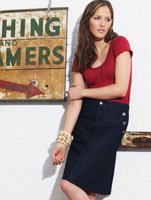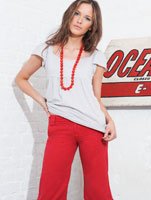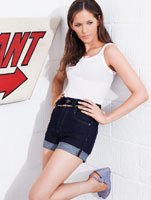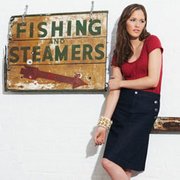Denim Report: Natural Wonder
In the eco-trend timeline, 2005 seems like ages ago. But in the premium-denim market, 2005 is very late in the race, which makes Tierra Del Forte both a pioneer in the marketing of organic denim, and a Johnny-Come-Lately in the $200 jeans category.
Headquartered in Berkeley, Calif., and aimed at the “eco chic” woman, Del Forte shipped the first orders of her eponymous line in 2006. “It was a risky time to enter the market,” says the designer, “but it’s a personal thing—it’s what I love doing. And I hope that if our jeans are different enough, people will buy them for reasons besides why they buy other premium jeans, and we’ll be around when the cycle turns up again.”
Though she thinks the premium-denim market has flattened out, Del Forte says her company is growing “really, really fast, but when you start from zero you have to.” The line is sold in such boutique retailers as Ron Herman Melrose, Fred Segal Fun, and Big Drop New York City. Wholesale price points run $80 for skirts to $118 for jackets. Most jeans are intended to retail for under $200. Del Forte buys certified organic cotton from an established denim mill, and the jeans are cut and sewn in El Paso, Texas.
Del Forte previously designed for a few companies she calls “specializers” in “fast and cheap” fashion. Del Forte wanted to apply what she’d learned of the apparel business, and also wanted to do something eco-friendly. “I took a good, hard look at the entire production process in making a pair of jeans,” she says. “The first step was looking at conventional cotton, which is a really ’dirty’ industry. I saw this one step I could take [using organic cotton] that would make a significant positive impact.”
When you care about the environment and social issues, Del Forte continues, “it’s a little hard to be involved in fashion because those kinds of things get trampled a lot. A large part of fashion is who can get stuff into stores the fastest and cheapest. If the environment or people making the stuff aren’t respectedhellip;that hasn’t been talked about until the past couple of years.”
By going organic and manufacturing in the United States, Del Forte thought she could both help out the environment and ensure good working conditions.
Organic cotton farming does not utilize pesticides, so there is no chemical runoff into the soil and water supply. “Once you start using chemical pesticides, your soil is less fertile and you need to use chemical fertilizer,” says Del Forte. “Not only is organic farming not harmful, it actually regenerates soil that’s been damaged from pesticide use.”
Moreover, manufacturing domestically would provide U.S. jobs and reduce her line’s carbon footprint. “Those things followed from this one light-bulb moment of ’If I use organic instead of conventional cotton, my jeans are going to be a lot cleaner than what’s on the market right now.’”
In 2005, she says, only she and Loomstate were working exclusively in organic denim. That has certainly changed, with many standard denim lines now offering organic alternatives as part of their collections. Del Forte sees both pros and cons of the burgeoning green movement. “I do think there’s going to be a lot of competition, but you can’t be in the fashion industry and not deal with competition,” she says. “And basically I want more organic cotton grown in the world. The more demand there is, that makes it a viable industry for the farmers. And I think consumer education is good for all of us.”
A Fitting Challenge
While Del Forte admits being jealous of the financial resources of big companies that are now rolling out organic products, Del Forte is “thrilled” that green is catching on in the public eye. However, she admits that organic fabric is still primarily an added value to the consumer, not a motive for purchase. Premium-denim consumers are still shopping overwhelmingly for fit, styling, and quality. In that sense, going organic is more of a personal vision for Del Forte than something with intrinsic value in the marketplace.
From a fashion perspective, Del Forte is steering away from basics to concentrate on interesting silhouettes and styling. She is doing well with wide legs and higher rises, “because you don’t have to be skinny to look great in them.”
And Del Forte takes the concept of sustainable to her designs as well as manufacturing process. “I think our strength lies in having really good designs that aren’t too over-the-top or trendy that they’re only good for one season,” she says. “To me that’s another part of being sustainable—creating things that people are going to buy and then keep for years.
“And it’s also a point of pride,” she adds, “because you don’t want to design something that people are going to toss to the back of their closet after a season.”
For example, Del Forte’s current bestseller is the Willow Trouser, a high-rise, wide-legged jean in a simple rinse-wash that requires no chemicals. “While it’s sort of a vaguely ’70s silhouette, it doesn’t look like you’re going to a ’70s-themed party. People are wearing it with their top tucked in and belted, but it also looks great under blousy tops. It makes everyone look tall and skinny, and that’s not going to go out of style.”
In the future, Del Forte wants to make organic denim more accessible to consumers. “We’re at a high price point and are only reaching a small segment of the market,” she says. “I’d like more people to be able to make the choice to buy organic.

























